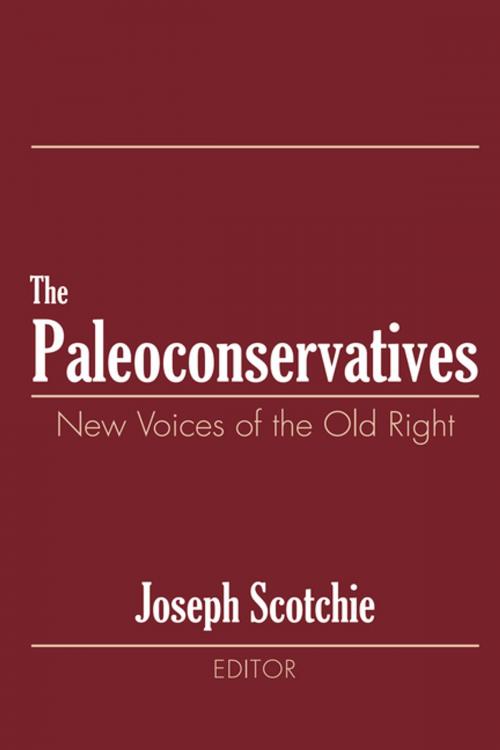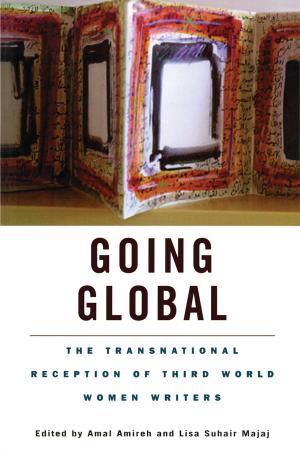The Paleoconservatives
New Voices of the Old Right
Nonfiction, Social & Cultural Studies, Political Science, Politics, History & Theory| Author: | Joseph A. Scotchie | ISBN: | 9781351477727 |
| Publisher: | Taylor and Francis | Publication: | July 5, 2017 |
| Imprint: | Routledge | Language: | English |
| Author: | Joseph A. Scotchie |
| ISBN: | 9781351477727 |
| Publisher: | Taylor and Francis |
| Publication: | July 5, 2017 |
| Imprint: | Routledge |
| Language: | English |
"Paleoconservatism" as a concept came into circulation during the 1980s as a rejoinder to the rise of neoconservatism. It signifies a brand of conservatism that rose up in opposition to the New Deal, setting itself against the centralizing trends that define modern politics to champion the republican virtues of self-governance and celebrate the nation's varied and colorful regional cultures. This volume brings together key writings of the major representatives of "Old Right" thought, past and present. The essays included here define a coherent intellectual tradition linking New York libertarians to unreconstructed Southern traditionalists to Midwestern agrarians. Part I is devoted to the founding fathers of the modern conservative movement. Essays by Frank Chodorov, Murray Rothbard, and James Burnham attack economic aspects of the New Deal, big government in general, and high taxes. Russell Kirk introduces the cultural paleoconservatism, with its preference for social classes and distinctions of age and sex, while Richard Weaver explains why culture is more important to a civilization's survival than mere material conditions. The second part covers the contemporary resurgence of the Old Right. Chilton Williamson, Jr. sets out the argument against large-scale immigration on cultural and economic grounds. The divisive issue of trade is covered. William Hawkins outlines a mercantilist trade policy at odds with the free trade libertarianism of Chodorov and Rothbard. On education, Allan Carlson goes further than the Beltway Right in his advocacy of home schooling. M.E. Bradford shows how the doctrine of equality of opportunity inevitably leads to greater and more tyrannical state action. The contemporary culture wars are the focus of Thomas Fleming, Paul Gottfried, Clyde Wilson, and Samuel Francis, who search for the roots of American nationalism, the lessons to be drawn from the past, and how they may be applied in the future.
"Paleoconservatism" as a concept came into circulation during the 1980s as a rejoinder to the rise of neoconservatism. It signifies a brand of conservatism that rose up in opposition to the New Deal, setting itself against the centralizing trends that define modern politics to champion the republican virtues of self-governance and celebrate the nation's varied and colorful regional cultures. This volume brings together key writings of the major representatives of "Old Right" thought, past and present. The essays included here define a coherent intellectual tradition linking New York libertarians to unreconstructed Southern traditionalists to Midwestern agrarians. Part I is devoted to the founding fathers of the modern conservative movement. Essays by Frank Chodorov, Murray Rothbard, and James Burnham attack economic aspects of the New Deal, big government in general, and high taxes. Russell Kirk introduces the cultural paleoconservatism, with its preference for social classes and distinctions of age and sex, while Richard Weaver explains why culture is more important to a civilization's survival than mere material conditions. The second part covers the contemporary resurgence of the Old Right. Chilton Williamson, Jr. sets out the argument against large-scale immigration on cultural and economic grounds. The divisive issue of trade is covered. William Hawkins outlines a mercantilist trade policy at odds with the free trade libertarianism of Chodorov and Rothbard. On education, Allan Carlson goes further than the Beltway Right in his advocacy of home schooling. M.E. Bradford shows how the doctrine of equality of opportunity inevitably leads to greater and more tyrannical state action. The contemporary culture wars are the focus of Thomas Fleming, Paul Gottfried, Clyde Wilson, and Samuel Francis, who search for the roots of American nationalism, the lessons to be drawn from the past, and how they may be applied in the future.















